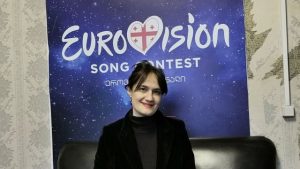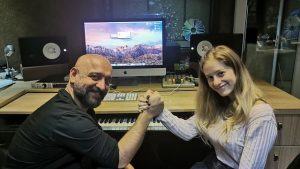Nobody does it better at the Junior Eurovision Song Contest than Georgia.
You probably know that Georgia has won the competition three times since their debut in 2007. That’s 3 wins out of 12. More impressive though is that this is backed up by two 2nd places, and a modal average of 4th place. With only one song ever placing outside the top 10 (and that was 111th) Georgia are to Junior Eurovision what Sweden are to the main Song Contest; consistent, professional and extremely successful.
What is particularly striking though isn’t the success on the scoreboard, but the amazing acts from Georgia on stage, parallel to nobody else in Junior Eurovision. Each year they bring acts that are such powerful, iconic and creative characters that possess a spellbinding combination of charisma and perfection to the stage. From bumblebees through princesses to brash Lady Gaga pop, each act is crafted in a way that few countries can compete with the joyous display on stage.
It’s a Junior Eurovision culture so successful and so different to anything anybody else can offer.
In the run up to Junior Eurovision this year I took a long detour to visit the country of Georgia. Somewhere in-between the fresh-flowing pomegranate juice and the abundant khachapuri, I managed to speak to some of the most important people in Georgian Junior Eurovision history. The aim – to discover their secret.
Success In One Contest, Failure In The Other
To kick-start my fact-finding mission, I reached out to Georgian broadcaster GPB. Georgia became an EBU active member in 2004, after the Rose Revolution the previous year led to a more pro-European regime and the country moved sharply towards European institutions.
I’m invited to have an interview with Natia Mshvenieradze, the Georgian Head of Delegation, up at the broadcaster’s headquarters. On the way up to her office we pass row after row of stale office doors that inspire little of that magical Georgian creativity.
That is until you reach the Eurovision office plastered in stickers and #ShineBright logos on the door.

Inside Georgian Eurovision HQ (Photo: Ben Robertson, ESC Insight)
Opening the door reveals a delight of colour with walls covered in huge posters and photos of almost each one of their acts from the Eurovision Song Contest and Junior Eurovision. The bookshelves are covered in DVD’s, CD’s and promo material from year’s gone by. The biggest Eurovision fans would be proud of this collection.
Me and Natia started our interview discussing this glorious office. It has been the Eurovision office since the country’s debut, and the diversity of faces on the wall is huge. Junior has the bumblebees, but the adult contest has ethno-jazz bands, Britpop rockers and romantic duets. There isn’t a country as diverse in either Song Contest as Georgia.
“To be honest,” starts Natia, “we always have tried to bring something new.”
The problem is though that none of these new concepts has brought Georgia close to the same success. Georgia may have seven qualifications from their 12 Eurovision Song Contest attempts, but the closest they arguably came was with ‘Waterfall‘ in 2013. It wasn’t Georgia’s highest placing (that was 9th), but did succeed in picking up a Marcel Bezençon Press Award (which yes, is on display in that office).
They are the emperors of Junior Eurovision, but the Joe Bloggs of the adult competition.
Despite only 12 attempts, in some respects speaking to Natia shows that they have already admitted some defeat in their quest for a first Eurovision victory.
“To be honest every year Georgia tries to bring something new. We are a small country. There is less chance to be a winner and be successful than other countries because of the voting system. We usually receive very good points from jury but not from televote.
“Last year’s we decided to bring to Europe and other people our Georgian language. It was not successful. It was difficult to understand. The reason we brought the Georgian language song is that as we can’t win and that we haven’t been successful for the last years let’s bring what we have and teach Europeans our language. Even if just one European learns just one Georgian word from our song then that is success.”

Head of Delegation Natia Mschvenieradze (Photo: Ben Robertson, ESC Insight)
It’s always a shame to hear a broadcaster look at the Eurovision voting system in despair, but they have tried to make changes to find the required spark. The biggest one in recent years has been the collaboration with Georgian Idol, which now chooses the singer for Eurovision. This has led to more interest and viewing figures in the country than the previous internal selections. Now in its second year, the broadcaster has also moved the competition forward to a December climax. This leaves time after the winner is selected to find the song right for them.
There is no requirement next year that the song must be in Georgian or English, and it will be up to the artist to choose.
One Man Behind All The Success
Junior Eurovision has gone through a similar transformation. It began with a National Final process that lasted from 2007 to 2011. However a problem emerged. The same composer kept on winning the competition, Giga Kukhianidze. From 2012 to 2017 he had the exclusive opportunity to write and produce the Georgian Junior Eurovision acts, and became Assistant Head of Delegation.
His last two entries in 2016 and 2017 were huge successes, one won and one second place just three points behind the eventual winner from Russia. However Natia explains that there was “a bit of anger towards public television” towards using the same composer.
“Junior Eurovision is not very very popular in Georgia compared to Malta or Poland. But step by step it is becoming more popular. Ratings have got higher and higher, more since the selection has become a part of the public, with Idol or Ranina (the Junior Eurovision selection format, a three month mission to find a singer).”
Part of this success in the ratings is also the start time. The 1600 CET start time means Junior Eurovision is now starting through Sunday primetime at 1900.
Success isn’t always measured in results, but in perception. For the Georgian public broadcaster a higher viewing population and more people engaging in the selection process is a big win. Georgi had five appearances on TV, scoring maximum points each show, before he reached the Ranina final.
But Giga Kukhianidze did not take part in the song selection process for Georgi, despite the call for songs and his previous success. From my time at the broadcaster it appeared clear that his involvement was by far the largest correlating factor to Georgia’s success.
So I tracked him down.
We eventually met the composer at his recording studio across in the Vake suburb of Tbilisi. The studio itself was hidden away in a secret courtyard off the busy road, down a graffiti-laden concrete tunnel with foam insulation ripped off drainpipes in desperate need of some TLC. I had to ring to check I was in the correct place.
Indeed I was, and the studio itself was bright, clean and smart. All of Giga’s accreditations from previous contests were on display as well as the CD’s of each of his Junior Eurovision acts. From what I can see the recording setup looks as professional as anything else I’ve witnessed. This was a little Eurovision oasis amidst the concrete jungle outside.
I had to ask the difficult question. Why are you no longer involved in Georgia’s Junior Eurovision? After all, nothing stops him sending his songs to the winning act of Ranina.
“It was a tough decision to make to not continue working with them. Junior Eurovision has its own disadvantages and advantages. Yes it is all the fun, but there are such limitations. It has to be appropriate to the child, and creativity is limited. Junior was done.
“Now I want to work with more mature projects, even though I still love working with kids.
“I want to do more…I want to do the actual Eurovision.”
Giga had certainly reached the heights of Junior Eurovision involvement in his last co-operation in 2017. The 2017 competition was in Tbilisi, and his roles included writing all the music for not just the Georgian act, but also the opening and interval acts of the show. It was the pinnacle of ten years of Georgia in Junior Eurovision.
The idea of sending a song to an Idol winner also doesn’t interest Giga.
“I don’t want to take part in the project because of the process of the selection. You need to take someone super trained, and not risk a beginner going on the stage.
“I am only interested in going to Eurovision if no one says anything, if I get control in the creative process, like it has been with Junior Eurovision.
“The bread only needs one baker.”
With a show like Idol, these demands are unlikely to be met. You don’t have control of who the winning act is, and you inevitably end up with many hands in the pot trying to find the correct solution.
I’m talking to Giga through a translator, who chips in with the line, “he’s a perfectionist”. To be honest, there isn’t anybody who would know that perfectionist trait than that translator. Her name is Iru Khechanovi and she has won Junior Eurovision.
I Discover The Georgian Secret
Iru was only 10 when she was selected to be part of the five piece group Candy that was hand picked by Giga from different studios around Georgia. The interview quickly turns to focus on her experience and I discuss the process of how their winning entry ‘Candy Music’ came to be.
“For Candy, we were five little girls. Giga asked us what is the theme that you want to sing about. We had homework to do research and I was thinking what is the best song for me and what would people want to listen to. We came to candy and thought every little girl loves candy!
We then thought about some sentences and some text ideas and some costumes with pink and we took part in that part of the process. I was proud because it’s mainly his job but he always asks his entrants for inspiration.”
That is step one of creating a Giga Junior Eurovision entry, working with the children to create the theme they want to portray on stage. Step two is the songwriting process, where Giga takes those ideas to create a reality. Giga continues.
“It’s not an easy job. I would always think for days and weeks with a locked door thinking about the theme of the song. I have to think also about the other countries and what they will think about it, and how our song will stand out. It’s not only about the song and its quality, but also the style of the design that had to be different from the other countries.”
Step three is then when the designers and choreographers come in. Even if the song itself is something the children are comfortable with, there is still the difficult decisions to make it appropriate on stage. Iru explains that she got to see all the designs and try all the fabrics and materials. The only uncomfortable feature was the huge wigs Candy wore for the music video, with ‘thousands’ of pins keeping them in place.
Step four, the final step is practice, practice, practice. Iru tells me that preparations start six months before Junior Eurovision itself and intensify as the time approaches.
“Every day there is a rehearsal for at least seven or eight hours. At times we would actually live in the studio. We also had another dance studio and dance for hours before having vocal lessons and harmonisations.
We would jump up and down the stairs, singing, so that you can balance the choreography and singing at the same time without running out of breath.”
“We also have lots of psychological tests with Giga and we would sit here in the studio and he would give us these tests with ‘What would you do if….” That process was very hard but he is the master of this.”

Giga Kikhianidze and Iru Khechanovi together at his recording studio (Photo: Ben Robertson, ESC Insight)
I’ve been asking each of these three people about what the secret is behind Georgia’s success. Natia thought it might be the ‘talent in the depths of Georgian culture’. Giga thought somewhat that Georgia had ‘got lucky’ that their acts stood out so successfully. Iru though, she knows the secret.
The secret is hard work, dedication, and perfection. 7 to 8 hours a day makes 50 hours in one week. 1000 hours of practice for just three minutes on stage.
I can say with full confidence that acts from the majority of countries competing in Poland will not have been dedicating such effort to their performances. It is little wonder that I’ve been mesmerised by the ability of Georgian acts and their millimetre-perfection and note-perfect harmonies. For sure, Georgia has proud musical tradition, and has certainly got lucky to have the right songs at the right time. But Georgian acts do put in such hard work into each act, and that hard work pays off on the scoreboard.
Is it too much for a 10-year-old or younger? Giga thinks not.
“It’s nothing for a 10 year old to take, but it depends on the person. If that person willing to do it amd is dedicated to do it. It is about special people, not every kid can do this.
“But you have to teach in a fun way, not stress out the children, not keep saying it’s a big scary competition.”
And Giga is right. We do need to make Junior Eurovision accessible and fun, but the reality is not everybody can step on the Eurovision stage, Junior or otherwise. Representing your country is a big challenge.
If anything, it’s the aftermath that’s tough to live with. Winning Junior Eurovision meant the girls from Candy were super busy post-2011. Iru mentions ‘stress’ and ‘time’ as factors that mean not all of them are pursuing music currently.
Where Does Everybody Go From Here?
For the Georgian broadcaster, they are heading to Poland with a polished act as usual. However we can note that, because of the Ranina selection process, Giorgi Rostiashvili only has only had weeks to perfect and polish his song rather than months.
I think if Giorgi manages to equal the eighth place Georgia received last year, the broadcaster would be satisfied. After all the show is more about viewing figures and reach than ever before. Especially with online voting, which is an extra barrier to a small country like Georgia.
For Giga, it seems that something would need to change for him to be part of the Eurovision bubble again soon. Giga is still working with many of Georgia’s Junior Eurovision alumni, and albums are promised soon. Georgia has a history of selecting acts internally, but another collaboration would not currently be a popular move considering the current Idol co-operation.
You may think that Iru, now 18, would be the perfect candidate for Idol. So did she, and she auditioned to take part last year. Iru got through the auditions but stumbled out before the televised rounds.
“For me, when I won Eurovision, I feel I have the hints of what they are looking for, you get it after working so hard. I don’t know if they understand what the Eurovision needs. I liked Oto’s song, but was it suitable for Eurovision, did people understand what it was about? It’s an emotional song for us Georgian and talks about our history. We would cry when we listen to it, but for Eurovision?”
Iru believes she is ready for the Eurovision Song Contest, and she has the perfect act ready. She wants to present a sassy, more mature and uptempo her for a new audience.
The composer and creative director…Giga, of course. Someone she describes as her ‘biggest friend and advisor’.
A Final Thought
Georgia is the most successful country in Junior Eurovision history and each year brings quality to the stage. There are many parts to the puzzle – the bizarre characters on stage to the beautiful compositions that match them perfectly are key. Also vital is a broadcaster that takes Junior Eurovision just as seriously as its older sibling and loves that it’s now primetime viewing on their main channel.
I knew all of this before I came to Tbilisi. What I didn’t know about was the effort and dedication it takes to be a Junior Eurovision star in Georgia.
That’s the Georgian secret.










Will there be podcasts from Gliwice?
Podcasts start Thursday morning from the Press Centre!
It’s the water, I tell ya. There’s something in that water of theirs that make them JESC-ready.
The question remains, why they can’t copy their success here and adapt it to the adult version?
If they are doing something right in this case, what are they doing wrong in ESC?